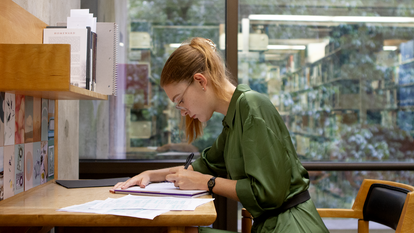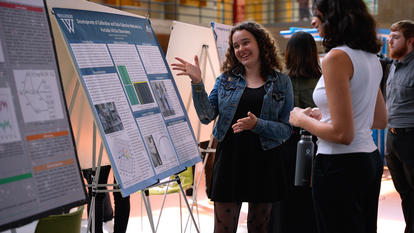Why the Secret to Success Might Be Mastering Failure

At the start of the fall semester, most Wellesley students are thinking, “I want to excel,” not, “I hope to make mistakes.” But can missteps and unexpected challenges ultimately lead to success?
Three faculty members say yes, if people are willing to reframe their expectations.
Olga Shurchkov ’01, associate professor of economics, studies gender differences in performance under competition and time pressure, and gender differences in leadership productivity. She believes that no true mastery of a subject or a profession is possible without first mastering failure at that exact activity, and that the sooner someone learns the inevitability of occasional failure, the less traumatic the experience will be. But sometimes women are reluctant to fail because they “set too high a standard for themselves,” she said.
Trial and error are expected in some fields, she notes, such as scientific research. “Research is a process that is comprised of failing, learning from that failure, and not giving up in order to find a solution. That’s why we run pilot studies. That’s why we have the peer review process to point out the errors in proposed studies,” she said. “If researchers gave up at the first sign of trouble, we wouldn't have any research at all.”
However, one must recognize when it’s time to give up on a particular approach and move on to something more productive, Shurchkov said: “It’s important to face failure and learn if it’s the kind that will lead to an improvement in the project or if it’s the kind that essentially ‘kills it.’”
Shurchkov cautions Wellesley students—and other perfectionists—not to undervalue successes as “givens” and dwell on failure as something unnatural, to be avoided. “It is important to duly recognize both experiences, not to discount happiness and overweight regret,” she said.
As she writes in her blog, “by being competitive and reading only A’s to mean success, we potentially avoid occupations and activities that we could truly enjoy and find successful in absolute terms. We are also much more miserable overall.”
Justin Armstrong, lecturer in writing and anthropology, says learning from failure is crucial at any age, and in any field. “The freedom to fail improves the creative process. In many ways I think it’s important to fail before you succeed, but those definitions are also fluid and dynamic,” he said. “Nothing ever remains a success, and previous failures can be reborn as new successes.”
That’s especially true in the business world and technology, Armstrong notes. For example, Roland’s TB-303 synthesizer, which was produced from 1981 to 1984, was designed to mimic a bass guitar, but sounded nothing like one. After production stopped, the TB-303 became a cult instrument among musicians, who used it to produce resonant and liquid sounds unlike those produced by any other instrument. “Here, I think we can learn that even our mistakes can sometimes resurface as new and valuable ideas,” Armstrong said. “I never discard my mistakes, I just put them away.”
What is often seen as failure is opportunity in disguise, Armstrong emphasizes. “Reflect, analyze, and move forward; don’t get stuck in the ‘what-if’ of setbacks and reroutings. In terms of reinventing the self, I think failure opens opportunities for self-analysis and reflection—something that can’t happen without unplanned rerouting. I like this idea better than ‘mistakes and failure.’”
Lee Cuba, professor of sociology and co-author of Practice for Life: Making Decisions in College, agrees that failure is inevitable at times, but “it takes some work to reach the point where failures can be seen as liberating,” he said. “What might be of greater importance is how people approach the decisions they make. If they don’t see decisions as opportunities to change, reflect, and grow, they are less likely to put themselves in a situation where they might fail.”
Students can practice making decisions and taking risks even in mundane settings, he said, such as eating with someone they don’t know well who may be very different from them and their friends. But if they view decision making as an obstacle course for which the best approach is avoidance to minimize risk, they may unwittingly make poor choices. For example, a student who is struggling in a class might not seek help from the professor because she does not want to appear lost or unintelligent.
“As fertile ground for a broad range of decisions, colleges are places where students are invited to try on different selves, discarding some, retaining others—perhaps even returning to some they had previously tossed aside,” Cuba said. “Every failure is an opportunity to learn something yourself, but you have to be willing to reflect on it in ways that don’t consume your definition of self. Students who view decisions as opportunities rather than obstacles tend to be more resilient.”



